人教版(2019)选择性必修第四册Unit 4 Sharing Reading and Thinking 课件(共33张PPT)
文档属性
| 名称 | 人教版(2019)选择性必修第四册Unit 4 Sharing Reading and Thinking 课件(共33张PPT) |
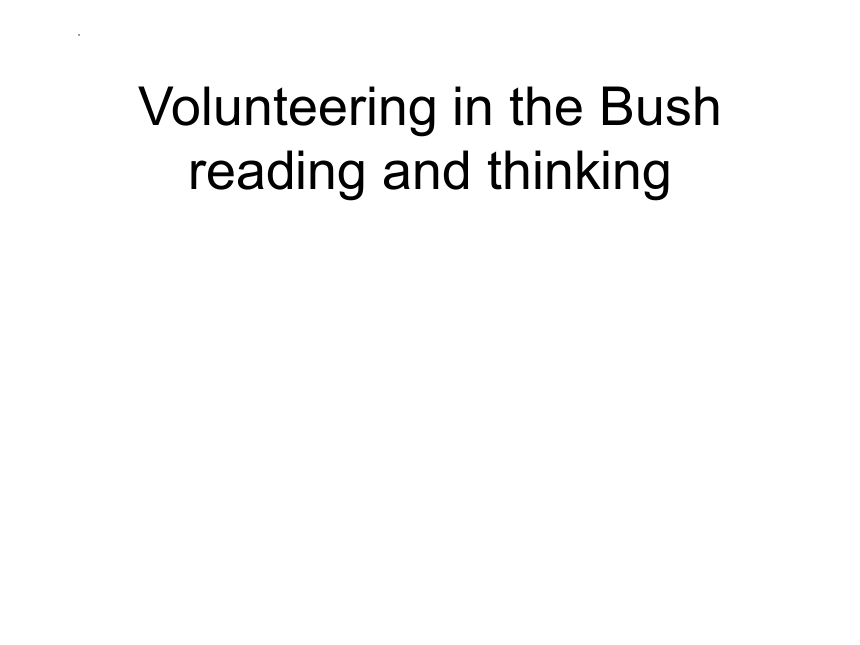
|
|
| 格式 | pptx | ||
| 文件大小 | 7.0MB | ||
| 资源类型 | 教案 | ||
| 版本资源 | 人教版(2019) | ||
| 科目 | 英语 | ||
| 更新时间 | 2024-05-29 11:34:12 | ||
图片预览

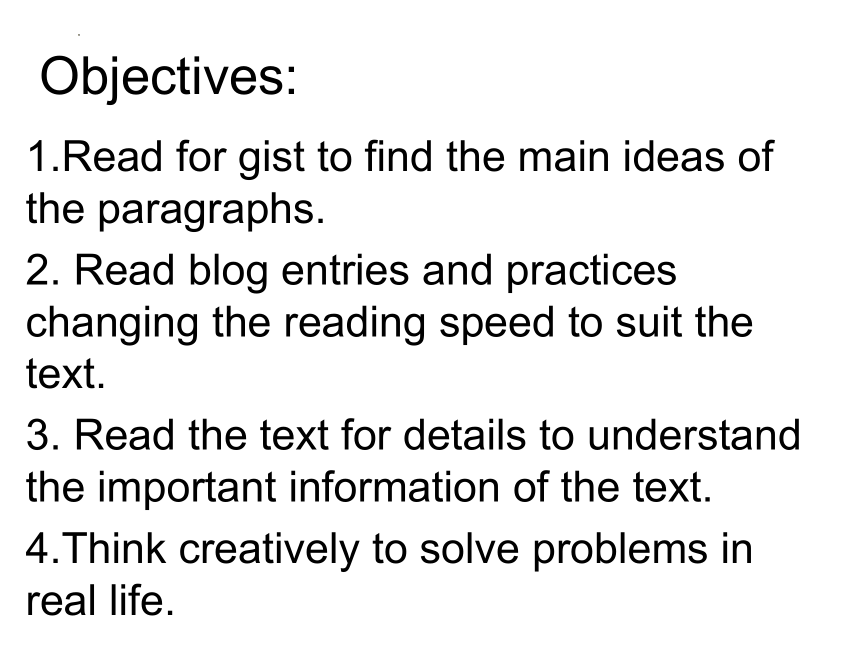
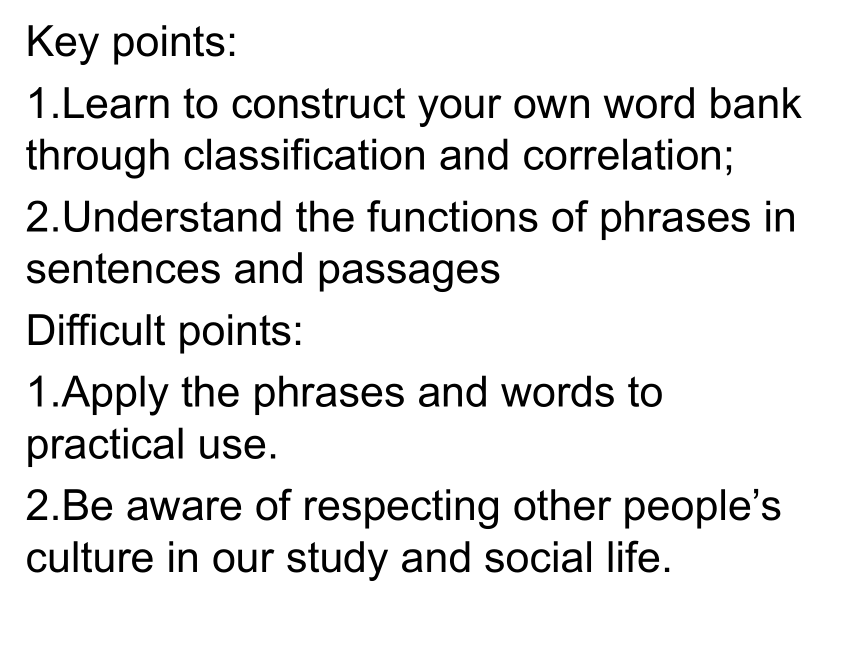
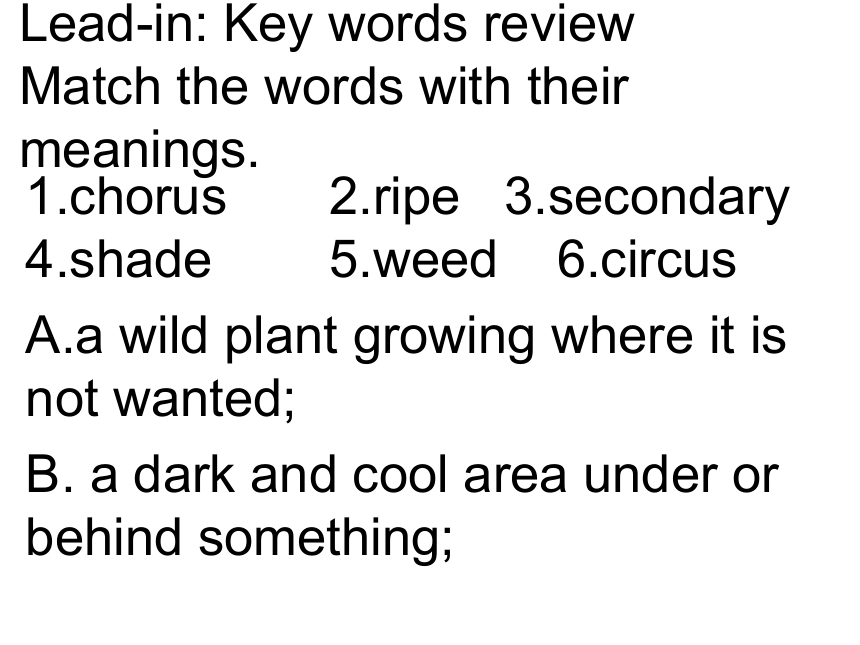
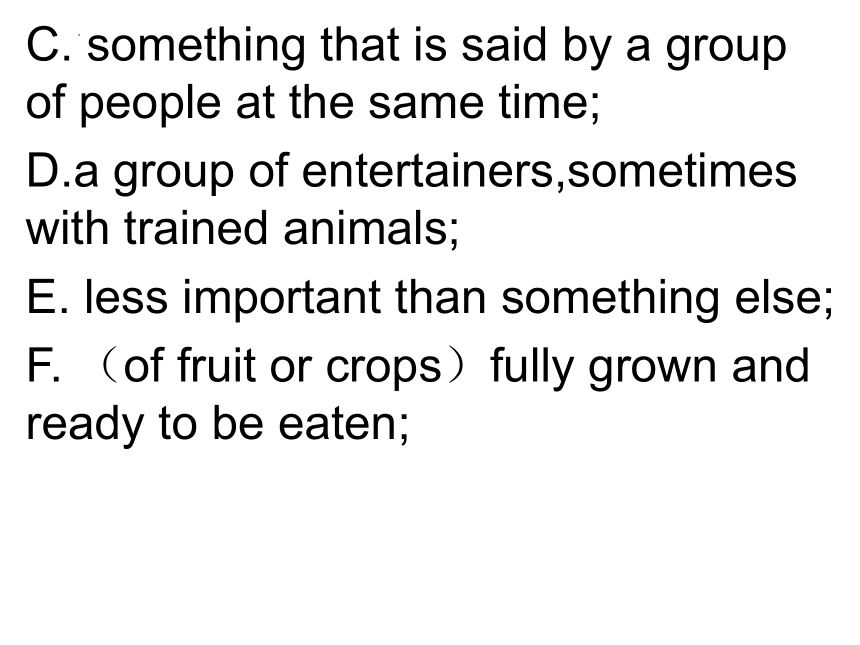
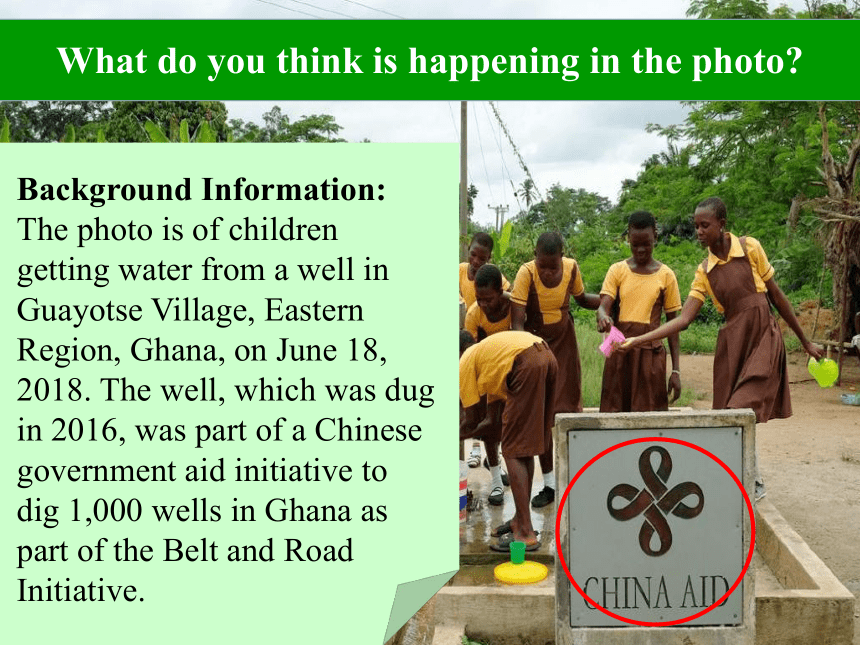

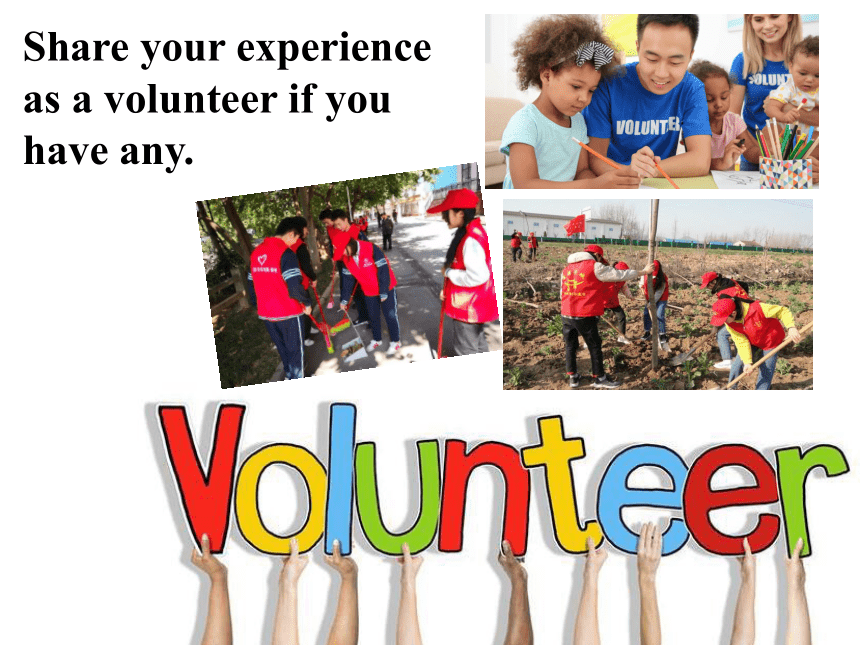
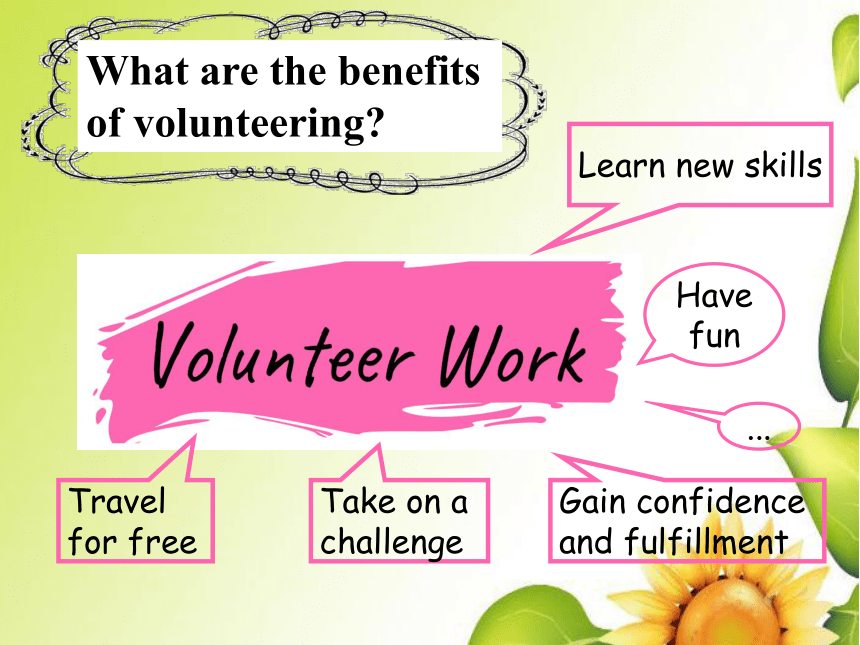

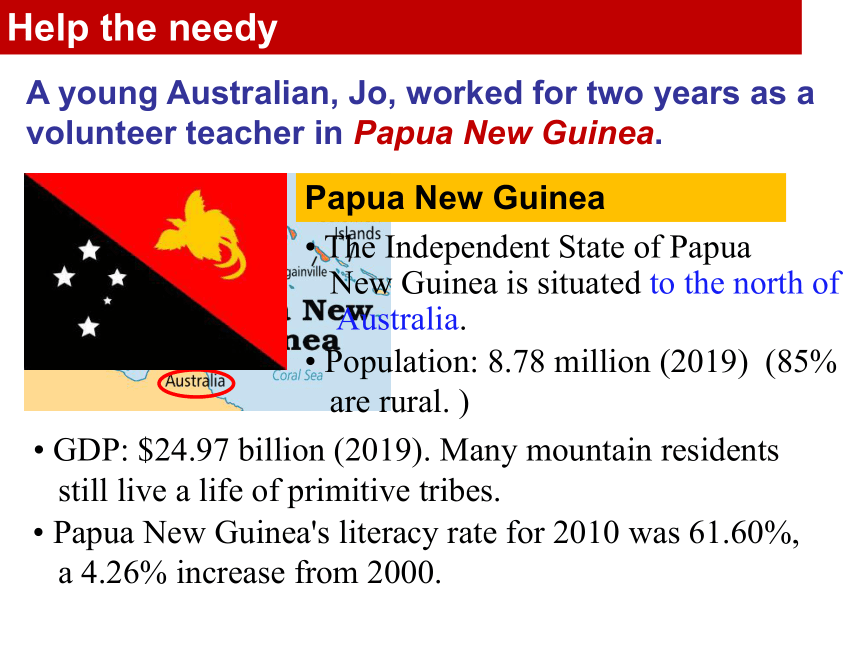
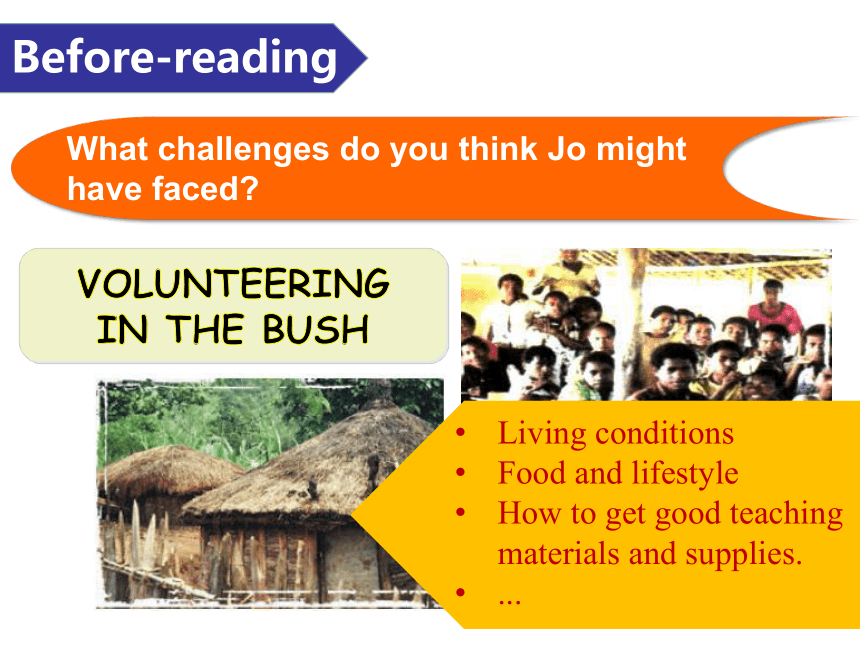
文档简介
(共33张PPT)
Volunteering in the Bush
reading and thinking
Objectives:
1.Read for gist to find the main ideas of the paragraphs.
2. Read blog entries and practices changing the reading speed to suit the text.
3. Read the text for details to understand the important information of the text.
4.Think creatively to solve problems in real life.
Key points:
1.Learn to construct your own word bank through classification and correlation;
2.Understand the functions of phrases in sentences and passages
Difficult points:
1.Apply the phrases and words to practical use.
2.Be aware of respecting other people’s culture in our study and social life.
Lead-in: Key words review
Match the words with their meanings.
1.chorus 2.ripe 3.secondary 4.shade 5.weed 6.circus
A.a wild plant growing where it is not wanted;
B. a dark and cool area under or behind something;
C. something that is said by a group of people at the same time;
D.a group of entertainers,sometimes with trained animals;
E. less important than something else;
F. (of fruit or crops)fully grown and ready to be eaten;
What do you think is happening in the photo
They're getting water from the well which were bulit with the help of China.
Background Information:
The photo is of children getting water from a well in Guayotse Village, Eastern Region, Ghana, on June 18, 2018. The well, which was dug in 2016, was part of a Chinese government aid initiative to dig 1,000 wells in Ghana as part of the Belt and Road Initiative.
What do you think of when you see this picture
Help
Friendship
love
Donation
Think about the things you do to help other people.
Write them down and share with your partner.
I often help people in need, such as carrying heavy bags for the old, donating clothes for the poor and helping the blind cross the road.
Share your experience as a volunteer if you have any.
What are the benefits of volunteering
Gain confidence and fulfillment
Learn new skills
Take on a challenge
Travel for free
Have fun
...
As you grow older, you will discover that you have two hands, one for helping yourself, the other for helping others.
—Sam Levenson
Help the needy
A young Australian, Jo, worked for two years as a volunteer teacher in Papua New Guinea.
Papua New Guinea
The Independent State of Papua
New Guinea is situated to the north of
Australia.
Population: 8.78 million (2019) (85%
are rural. )
Papua New Guinea's literacy rate for 2010 was 61.60%,
a 4.26% increase from 2000.
GDP: $24.97 billion (2019). Many mountain residents
still live a life of primitive tribes.
What challenges do you think Jo might have faced
Before-reading
VOLUNTEERING
IN THE BUSH
Living conditions
Food and lifestyle
How to get good teaching materials and supplies.
...
Volunteering in the Bush
I just got a parcel from home! It took about two weeks to arrive, and it was a bit damaged, but it was so nice to get some sweets and jam from home; I've been dying to have some of my favourite sweets, and it's always nice to get mail!
8 March
So I've been here in the jungle for about a month now. My secondary school is a bush school. The classrooms are made of bamboo, with clay floors and roofs of grass. It takes me only a few minutes to walk to school down a dusty track covered in weeds. When I reach the school grounds, I'm
greeted by a chorus of
“good morning”from the
boys. Unlike
students in our
country, these
boys do not
wear cotton
uniforms,
and many of them also have to walk a long way, sometimes for up to two hours, just to get to school.
There's no electricity, running water or even textbooks, not to mention laptops, tablets, or other modern devices! All the students have are pencils, rubbers, and paper. I'm still trying to
adapt to these conditions. I've had to become much more imaginative in my teaching. Science is my most challenging subject as my students have no concept of doing experiments. There is no equipment, and since there isn't even a washroom, if I need water I have to carry it from my house in a
basin! It's important not to be too rigid about rules here, too. The other day I was showing the boys
a chemistry experiment when, before I knew it, the mixture was bubbling out of the test tube spilling everywhere! The class became a circus as the boys, who had never
come across anything like
this before, started jumping
out of the windows.
Sometimes I wonder how
relevant chemistry is to these students—few will
ever become chemists—and most
will be going back to their
villages after Year 8 anyway. To
be honest, I doubt whether I'm
making any difference to these
boys'lives at all.
Last weekend I made my first visit to a remote village, home to one of our students, Tombe. Another teacher and I walked for two and a half hours to get there—first, up a mountain from where we had fantastic views, and then down a shaded path to the valley below. When we arrived at the village, Tombe's mother, Kiak, saw us coming and
started crying “ieee
ieee”. We shook hands
with all the villagers.
Everyone seemed to be
related to Tombe.
17 April
Tombe's father, Mukap, a man with a strong jaw and a wrinkled forehead, led us to his house, a low, round bamboo hut with no windows, with a door just big enough to
get through, and with grass sticking out of the roof—this shows it is a man's house. Such housing is dark inside so it took time for our eyes to adjust. Fresh grass had been laid on the floor and there was a platform for Jenny and me to sleep on. There was a fireplace in the centre of the hut. The only possessions I could see were
one broom, a few saucers, a kettle, cups, pans, and a couple of jars.
Mukap built a fire outside and laid stones on it to heat. He then placed the hot stones in an empty oil drum with kau kau (sweet potato), ripe corn, and greens. He then covered the vegetables with banana leaves and left them to steam. It smelled delicious. We ate inside the hut sitting round the fire. I loved listening to the family talking softly to each other in
their language, even though I could not participate much in the conversation. Luckily, Tombe interpreted for us.
Later, I noticed a can standing upside down on the grill over the fire. After a while, Tombe threw it out of the doorway. Tombe told me that the can was heated to dry out the leftover food. His family believes that leftovers attract bad spirits in the night, so any leftover food is dried up in a can and the can is then thrown out of the hut.
We left the village the next morning after many goodbyes and firm handshakes. My muscles were aching and my knees shaking as we dragged ourselves down the mountain towards home. That evening I fell happily into bed. It was such a privilege to have spent a day with Tombe's family.
Her experience of voluntary teaching at a bush school
A visit to a local family
The challenges she met
The positive aspects of her voluntary work.
Her feelings and attitudes to her voluntary work
The people, and the life there.
What does Jo mainly talk about in her blog
_____________________________
Para. 1
Para. 2-3
Para. 4-7
Para. 8
Jo was excited about the parcel she got from home.
______________________________
_____________________________
________________________________________________________________________________________________
The poor material and teaching conditions in the bush school and the introduction of the students there.
An unforgettable visit to a student's home in a remote village.
Leaving the village: tired but happy
Read the blog entries and complete the chart below with the main idea of each part.
An unforgettable visit to a student's home in a remote village.
Read paragraphs 2-3 and complete the chart below.
The Bush School Classroom They were made of _______, with ________
__________________.
Students 1. All of them are _____, and they are
________ to me.
2. They don't wear _______________.
3. Many of them _____________ to get to
school.
Teaching conditions There is no ___________________________
____________________, not to mention ____________________________________.
bamboo
clay floors
and roofs of grass
boys
friendly
cotton uniform
walk a long way
electricity, running water, textbook,
equipment or washroom
laptops, tablets, or other modern devices
Read paragraphs 4-7. Write T(true) or F(false) and correct the false statement(s).
1. Jo and another teacher took the bus to get
Tombe's village.
2. There was a comfortable bed for Jenny and Jo
to sleep on.
3. The possessions in the hut were one broom, a
few saucers, a kettle, cups, pans, and a couple
of jars.
4. Tombe's family were talking in English during
the meal.
F
F
T
F
walked for two and a half hours
platform
their language
Answer the following questions.P39
1. What do you think “the bush” means
A wilderness area.
2. What has been Jo's most challenging subject to
teach Why
It's science, because her students have no concept
of doing experiments and there is no equipment.
3. What did Jo notice about the homes in the village
she visited
They were low, round bamboo huts with no
windows, with a door just big enough to get through, and with grass sticking out of the roof.
Answer the following questions.
4. What did Jo notice after the meal
A can standing upside down on the grill over the fire.
5. What is Jo’s general impression of the place and
people there
She loved being there and felt it was a privilege to have spent a day with them.
Analyse Jo’s impressions of life in the village she visited.
Positive aspect Negative aspect
The students value education No running water or electricity
Able to get mail;
Take only a few minutes to walk to school;
The students are friendly;
Fantastic scenery;
Nice people;
Interesting culture
No running water or electricity;
No textbooks or supplies;
The students have no concept of doing experiments;
No washroom;
The students may not be able to use what they have learnt;
Have to walk a long distance to go anywhere;
No beds, few possessions
discussion
Post-reading
1. Jo felt it was a privilege to have spent a day with
Tombe's family. If you were Jo, how do you think
you would have felt Why
Suggested answer:
I would have felt privileged as well, as it was a rare chance to glimpse into another culture that most people will never have.
discussion
2. What are the differences between the school
you go to and the one described in the passage
The bush school Our school
Teaching building
Classrom
Dining hall
Curriculum
...
discussion
3. Would you like to become a volunteer teacher
Why or why not
Suggested answer:
I think it would be interesting to do that for a while. It would be a good oppotunity to make a difference to someone else's life, and also to learn about a new culture.
Assignments:
导学案P96
导学案核心单词的背诵
Reflection:
Let the students read the text and help them solve the difficulties they meet in the text.
Volunteering in the Bush
reading and thinking
Objectives:
1.Read for gist to find the main ideas of the paragraphs.
2. Read blog entries and practices changing the reading speed to suit the text.
3. Read the text for details to understand the important information of the text.
4.Think creatively to solve problems in real life.
Key points:
1.Learn to construct your own word bank through classification and correlation;
2.Understand the functions of phrases in sentences and passages
Difficult points:
1.Apply the phrases and words to practical use.
2.Be aware of respecting other people’s culture in our study and social life.
Lead-in: Key words review
Match the words with their meanings.
1.chorus 2.ripe 3.secondary 4.shade 5.weed 6.circus
A.a wild plant growing where it is not wanted;
B. a dark and cool area under or behind something;
C. something that is said by a group of people at the same time;
D.a group of entertainers,sometimes with trained animals;
E. less important than something else;
F. (of fruit or crops)fully grown and ready to be eaten;
What do you think is happening in the photo
They're getting water from the well which were bulit with the help of China.
Background Information:
The photo is of children getting water from a well in Guayotse Village, Eastern Region, Ghana, on June 18, 2018. The well, which was dug in 2016, was part of a Chinese government aid initiative to dig 1,000 wells in Ghana as part of the Belt and Road Initiative.
What do you think of when you see this picture
Help
Friendship
love
Donation
Think about the things you do to help other people.
Write them down and share with your partner.
I often help people in need, such as carrying heavy bags for the old, donating clothes for the poor and helping the blind cross the road.
Share your experience as a volunteer if you have any.
What are the benefits of volunteering
Gain confidence and fulfillment
Learn new skills
Take on a challenge
Travel for free
Have fun
...
As you grow older, you will discover that you have two hands, one for helping yourself, the other for helping others.
—Sam Levenson
Help the needy
A young Australian, Jo, worked for two years as a volunteer teacher in Papua New Guinea.
Papua New Guinea
The Independent State of Papua
New Guinea is situated to the north of
Australia.
Population: 8.78 million (2019) (85%
are rural. )
Papua New Guinea's literacy rate for 2010 was 61.60%,
a 4.26% increase from 2000.
GDP: $24.97 billion (2019). Many mountain residents
still live a life of primitive tribes.
What challenges do you think Jo might have faced
Before-reading
VOLUNTEERING
IN THE BUSH
Living conditions
Food and lifestyle
How to get good teaching materials and supplies.
...
Volunteering in the Bush
I just got a parcel from home! It took about two weeks to arrive, and it was a bit damaged, but it was so nice to get some sweets and jam from home; I've been dying to have some of my favourite sweets, and it's always nice to get mail!
8 March
So I've been here in the jungle for about a month now. My secondary school is a bush school. The classrooms are made of bamboo, with clay floors and roofs of grass. It takes me only a few minutes to walk to school down a dusty track covered in weeds. When I reach the school grounds, I'm
greeted by a chorus of
“good morning”from the
boys. Unlike
students in our
country, these
boys do not
wear cotton
uniforms,
and many of them also have to walk a long way, sometimes for up to two hours, just to get to school.
There's no electricity, running water or even textbooks, not to mention laptops, tablets, or other modern devices! All the students have are pencils, rubbers, and paper. I'm still trying to
adapt to these conditions. I've had to become much more imaginative in my teaching. Science is my most challenging subject as my students have no concept of doing experiments. There is no equipment, and since there isn't even a washroom, if I need water I have to carry it from my house in a
basin! It's important not to be too rigid about rules here, too. The other day I was showing the boys
a chemistry experiment when, before I knew it, the mixture was bubbling out of the test tube spilling everywhere! The class became a circus as the boys, who had never
come across anything like
this before, started jumping
out of the windows.
Sometimes I wonder how
relevant chemistry is to these students—few will
ever become chemists—and most
will be going back to their
villages after Year 8 anyway. To
be honest, I doubt whether I'm
making any difference to these
boys'lives at all.
Last weekend I made my first visit to a remote village, home to one of our students, Tombe. Another teacher and I walked for two and a half hours to get there—first, up a mountain from where we had fantastic views, and then down a shaded path to the valley below. When we arrived at the village, Tombe's mother, Kiak, saw us coming and
started crying “ieee
ieee”. We shook hands
with all the villagers.
Everyone seemed to be
related to Tombe.
17 April
Tombe's father, Mukap, a man with a strong jaw and a wrinkled forehead, led us to his house, a low, round bamboo hut with no windows, with a door just big enough to
get through, and with grass sticking out of the roof—this shows it is a man's house. Such housing is dark inside so it took time for our eyes to adjust. Fresh grass had been laid on the floor and there was a platform for Jenny and me to sleep on. There was a fireplace in the centre of the hut. The only possessions I could see were
one broom, a few saucers, a kettle, cups, pans, and a couple of jars.
Mukap built a fire outside and laid stones on it to heat. He then placed the hot stones in an empty oil drum with kau kau (sweet potato), ripe corn, and greens. He then covered the vegetables with banana leaves and left them to steam. It smelled delicious. We ate inside the hut sitting round the fire. I loved listening to the family talking softly to each other in
their language, even though I could not participate much in the conversation. Luckily, Tombe interpreted for us.
Later, I noticed a can standing upside down on the grill over the fire. After a while, Tombe threw it out of the doorway. Tombe told me that the can was heated to dry out the leftover food. His family believes that leftovers attract bad spirits in the night, so any leftover food is dried up in a can and the can is then thrown out of the hut.
We left the village the next morning after many goodbyes and firm handshakes. My muscles were aching and my knees shaking as we dragged ourselves down the mountain towards home. That evening I fell happily into bed. It was such a privilege to have spent a day with Tombe's family.
Her experience of voluntary teaching at a bush school
A visit to a local family
The challenges she met
The positive aspects of her voluntary work.
Her feelings and attitudes to her voluntary work
The people, and the life there.
What does Jo mainly talk about in her blog
_____________________________
Para. 1
Para. 2-3
Para. 4-7
Para. 8
Jo was excited about the parcel she got from home.
______________________________
_____________________________
________________________________________________________________________________________________
The poor material and teaching conditions in the bush school and the introduction of the students there.
An unforgettable visit to a student's home in a remote village.
Leaving the village: tired but happy
Read the blog entries and complete the chart below with the main idea of each part.
An unforgettable visit to a student's home in a remote village.
Read paragraphs 2-3 and complete the chart below.
The Bush School Classroom They were made of _______, with ________
__________________.
Students 1. All of them are _____, and they are
________ to me.
2. They don't wear _______________.
3. Many of them _____________ to get to
school.
Teaching conditions There is no ___________________________
____________________, not to mention ____________________________________.
bamboo
clay floors
and roofs of grass
boys
friendly
cotton uniform
walk a long way
electricity, running water, textbook,
equipment or washroom
laptops, tablets, or other modern devices
Read paragraphs 4-7. Write T(true) or F(false) and correct the false statement(s).
1. Jo and another teacher took the bus to get
Tombe's village.
2. There was a comfortable bed for Jenny and Jo
to sleep on.
3. The possessions in the hut were one broom, a
few saucers, a kettle, cups, pans, and a couple
of jars.
4. Tombe's family were talking in English during
the meal.
F
F
T
F
walked for two and a half hours
platform
their language
Answer the following questions.P39
1. What do you think “the bush” means
A wilderness area.
2. What has been Jo's most challenging subject to
teach Why
It's science, because her students have no concept
of doing experiments and there is no equipment.
3. What did Jo notice about the homes in the village
she visited
They were low, round bamboo huts with no
windows, with a door just big enough to get through, and with grass sticking out of the roof.
Answer the following questions.
4. What did Jo notice after the meal
A can standing upside down on the grill over the fire.
5. What is Jo’s general impression of the place and
people there
She loved being there and felt it was a privilege to have spent a day with them.
Analyse Jo’s impressions of life in the village she visited.
Positive aspect Negative aspect
The students value education No running water or electricity
Able to get mail;
Take only a few minutes to walk to school;
The students are friendly;
Fantastic scenery;
Nice people;
Interesting culture
No running water or electricity;
No textbooks or supplies;
The students have no concept of doing experiments;
No washroom;
The students may not be able to use what they have learnt;
Have to walk a long distance to go anywhere;
No beds, few possessions
discussion
Post-reading
1. Jo felt it was a privilege to have spent a day with
Tombe's family. If you were Jo, how do you think
you would have felt Why
Suggested answer:
I would have felt privileged as well, as it was a rare chance to glimpse into another culture that most people will never have.
discussion
2. What are the differences between the school
you go to and the one described in the passage
The bush school Our school
Teaching building
Classrom
Dining hall
Curriculum
...
discussion
3. Would you like to become a volunteer teacher
Why or why not
Suggested answer:
I think it would be interesting to do that for a while. It would be a good oppotunity to make a difference to someone else's life, and also to learn about a new culture.
Assignments:
导学案P96
导学案核心单词的背诵
Reflection:
Let the students read the text and help them solve the difficulties they meet in the text.
